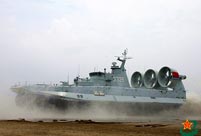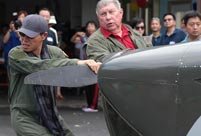

August 30 witnessed a repeat of the cowardly act of terror attacks on foreign missions, a sport of clandestine groups that try to enforce their intention through violence.
It was yet another assault on the foreign mission of the Peoples Republic of China in Bishkek, Kyrgyzstan.
The terror world of today has made such attacks on foreign missions that should be inviolable like normal occurrence reason the world has witnessed such for 129 times since 2000. They are done in defiance of the rules of diplomatic immunity enshrined in the Vienna Convention on Diplomatic Relations, 1961 outlining the ways the diplomat and diplomatic missions should be protected from assaults and interferences that would hamper smooth diplomatic relationships between nations. Because the treaty is ratified so far by 190 countries as at 2014, it is not expected to come under such constant breaches as witnessed so very often in most parts of the world. Right now such attacks have become coercive means of blackmail by attackers to achieve a point against the targeted state or group of states.
Exposure to international issues has also made many countries that are the most involved in conflicts or business deals the most vulnerable to such affronts. USA, for instance with 24 foreign missions assaults within the period is the highest and next to it is China with 19 incidents inclusive of that of August 30 in Bishkek. While this might be aligned with the price tag of prominence and influence, it still worries why the latest attack on Chinese mission in the same Asian continent came just few days to the G20 Summit hosted in China.
A lot of things, including lethal garbage, are thrown into the diplomatic mix that nothing is regarded as coincidence in the deals and duels. That is why China has to watch closely that attack and know the motive as most of them are done to browbeat a country to get certain things done or inflict on them pains for whatever the attacker or the one such works for targets.
Before settling to the Summit which to the man in the street is just a platform to discuss mutual economic issues, but not exactly that in diplomatic circles, there have been some vexed international issues involving the major players.
For China there have been the South China Sea matter and later the decision of an arbitral panel in The Hague on July 12. That incident heated the international polity so much that even parties that should ordinarily be watchers all took sides and wanted some pound of flesh from one side or the other.
There has been unease in the circle of the T3 of East Asia – China, Japan and South Korea. In May, delegations from the three met in an enlarged forum in Beijing to discuss matters of importance to all of them. But the parley that targeted economic issues for the three that make up more than 72% of the Asian economy and some 31% of the world economy was unfortunately derailed into focusing on the tension in the Korean Peninsula. That later overshadowed other more compelling interests.
In recent months, the restlessness of the DPRK in toying with nuclearization of the Korean Peninsula has driven tension to fever pitch in the region and watching the matter closely, it suggests the country that totters at the brink of frustration is about succeeding in dragging the powerful neighbors into her dirt. The T3 live at no-friend-no-foe basis where they kind of watch each other with some level of suspicion and a Chinese media even questioned last week the kind of guest Japan is going to be at the Hangzhou G20 Summit this weekend.
In the bid to defend self from a reckless neighbor, South Korea had to seek a means of repelling the impending nuclear infraction by the neighbor to the north of the peninsula. But the involvement of outsider USA in the deployment of THAAD intended to be located in Seongju flared tempers.
Russia and China are ill at ease with that arrangement they argue its surveillance reach of 2000km would encroach on their domain and make them vulnerable by causing an infringement of their territorial integrity. While the dingdong has not been resolved though South Korea seem to be buckling under internal pressure by the citizens who revolt against it, there are still diplomatic moves to douse tension going on.
Even the meeting of the Foreign Ministers of the T3 last week in Tokyo might not have achieved much or if it did, many have not been informed judging from the China media report of last week questioning Japan’s status at Hangzhou.
Meanwhile, beyond the local tensions and frictions in the East Asian axis of power, there is the larger interest that plays out in the global arena.
China gets stronger economically everyday to the fear of some other powers. Her reach, especially this year, in foreign direct investments (FDI) and mergers and acquisitions (FDI) have been really rapacious.
As at end of July, her FDI and M&A so far had hit a blistering $165b, surpassing her total for 2014 and 2015 put together. They are in Europe mainly and some in America, including her dominant presence in the business pool of the last Rio Olympic Games where it supplied most of the security gargets at the event venues and the trains that operated the subways that transported contingents.
China looks to target business today more than before and there are interests that are protected and as well hurt, especially among those that don’t feel comfortable with some other powers having overarching reach.
Between June 17 and 24, President Xi Jinping visited three East Europe countries, including Poland, Uzbekistan, and Serbia, and Czech Republic earlier in April. The reason for the visits was to enlarge China’s influence and business reach. In Poland, Xi was like inspecting an existing link to be sure it still works. It was in January 2013 that the railway linkage between Chengdu in China and Lodz in Poland came alive. Over these years more than 7000 train journeys have been made between the two points and the journey that used to last ordinarily for 72 days was cut to 14 days by the new linkage. You can say it over and again that President Xi means business and pursues business.
Xi announced his business slant very early as he came to power. The March/April 2016 edition of the China International Studies Journal at Page 5 explained the Belt and Road Initiative of China in a most interesting phrase. The article written by Su Ge said: “In September 2013, in Kazakhstan, President Xi Jinping first proposed countries work together to build a Silk Road Economic Belt. A month later in Indonesia, he further proposed to join hands with other countries to create a 21st Century Maritime Silk Road. Connecting the two economic circles of Asia-Pacific and Europe and covering such regions as Central Asia, South Asia, South East Asia, West Asia and Africa, the Belt and Road Initiative (BRI) – as the New Silk Road is now known – is widely regarded as the economic cooperation with the largest coverage and greatest potential in the world.” In middle of August, at a meeting in Beijing, Xi announced the success of the BRI, and said on the project, China had signed economic agreements with more than 50 countries and when fully implemented, it is expected to cover more than 60% of the world’s population.
On June 27, fireworks and celebration announced the opening of the new and expanded Panama Canal in Central America, and who tested the use of the canal? It was a Chinese vessel. And it was reported all over the world that: “A huge Chinese ship carrying almost 9,500 metal cargo containers entered the newly expanded Panama Canal on 26 June, ushering in a new era for global trade. The ship was greeted by fireworks and thousands of Panamanians who gathered at Cocoli locks to celebrate. The Chinese vessel, Cosco Shipping Panama, was pulled by many tugboats into the new Agua Clara locks in Colon Province, almost 50 miles north of Panama City.”
Suning, the Jiangsu trading giant has also concluded business deals with Manchester City Club of England with an earlier deal with La Liga of Spain. The latest was the signing of a take-over of the ownership of AC Milan, the Italian football club from former owner, Silvio Berlusconi by the Sino-European Sports Investment. Hisense advert interest in the last Euro Cup, Wanda’s FIFA endorsement and lately in early August the acquisition of a substantial shareholding of the Brazilian Azul Air by Hainan Airline, the largest private airline in China are just enormous. The Azul deal happened the same week with Cosco Shipping acquisition of about 67% of the shareholding of Pireaus Port in Greece, the largest seaport on the Mediterranean Sea.
Even now, there are still pending business deals like the stalled nuclear power plant project in the United Kingdom and the recent approval by the US for the China National Chemical Corp to acquire $43 billion stake in the Swiss agrochemicals giant, Syngenta.
All these task China to avoid distractions at the international scene and also to step up better negotiation like never before. Good enough the country is not known for aggression and therefore the unhealthy closeness of the foreign mission assault on China in the same week the G20 commences calls for more caution on the nation and more tact in negotiations at the forum.
Emewu, senior editor of The Sun Newspaper, Nigeria, is Fellow of the China Public Diplomacy on China Africa media exchange in Beijing and intern with People’s Daily ([email protected])
 Shenzhen seizes 549 tons of illegally smuggled clothing
Shenzhen seizes 549 tons of illegally smuggled clothing Chinese actor Wang Baoqiang divorces wife, fires manager
Chinese actor Wang Baoqiang divorces wife, fires manager New hovercrafts debut in landing exercise
New hovercrafts debut in landing exercise Home-made plane completes test flight in Chicago
Home-made plane completes test flight in Chicago Huangluo: China's 'long hair village'
Huangluo: China's 'long hair village' Spectacular bridge with one of the tallest piers in the world
Spectacular bridge with one of the tallest piers in the world Magnificent view of Hukou Waterfall
Magnificent view of Hukou Waterfall Woman sets Guinness World Record with 17-month-long pregnancy
Woman sets Guinness World Record with 17-month-long pregnancy A glimpse of Stride 2016 Zhurihe B military drill
A glimpse of Stride 2016 Zhurihe B military drill Top 10 livable Chinese cities
Top 10 livable Chinese cities Top 20 hottest women in the world in 2014
Top 20 hottest women in the world in 2014 Top 10 hardest languages to learn
Top 10 hardest languages to learn China’s Top 10 Unique Bridges, Highways and Roads
China’s Top 10 Unique Bridges, Highways and Roads Australia’s security paranoia baffles China
Australia’s security paranoia baffles China
 Big love can come in small packages
Big love can come in small packages
 As traditional family lifestyle breaks down, more youngsters are living solo than ever before
As traditional family lifestyle breaks down, more youngsters are living solo than ever before
 Foreigners spice up Chinese instant noodle recipes with unique ingredients, concocting new and interesting flavor creations
Foreigners spice up Chinese instant noodle recipes with unique ingredients, concocting new and interesting flavor creations
Day|Week